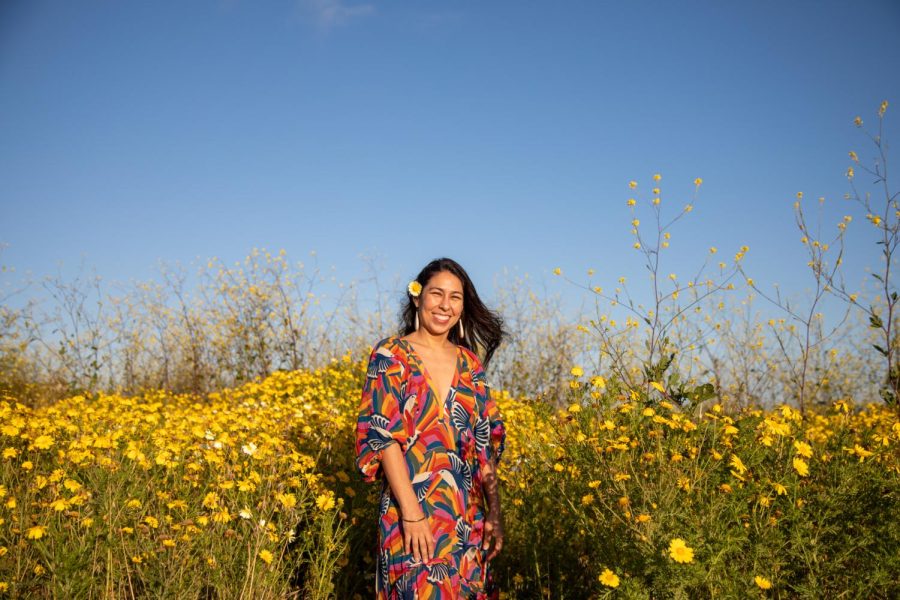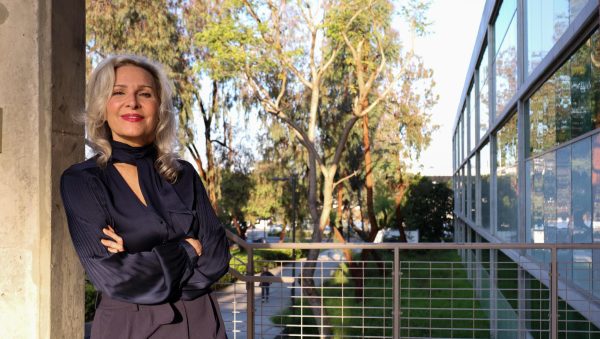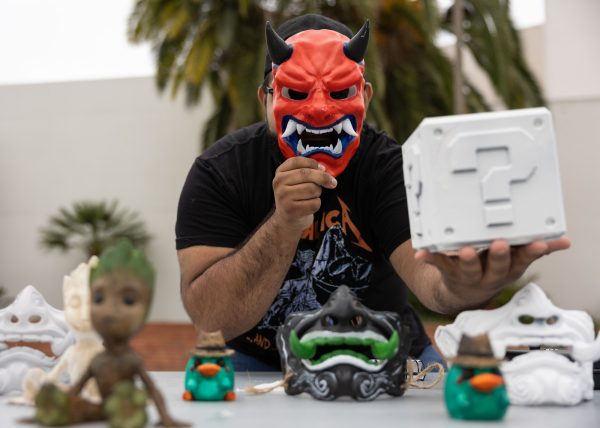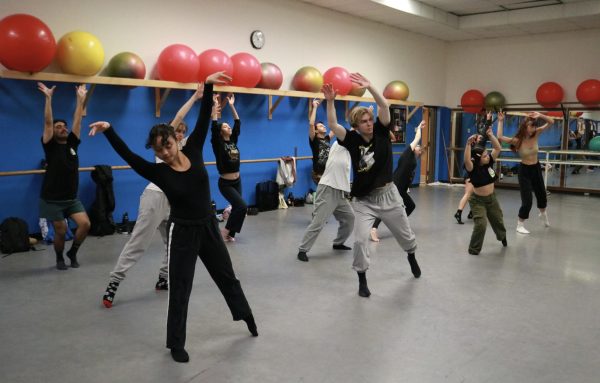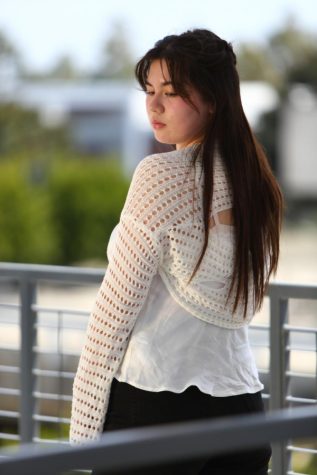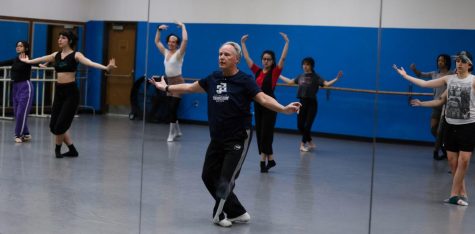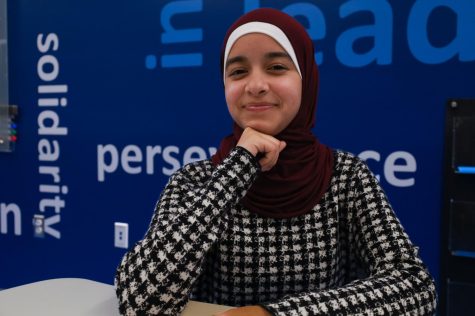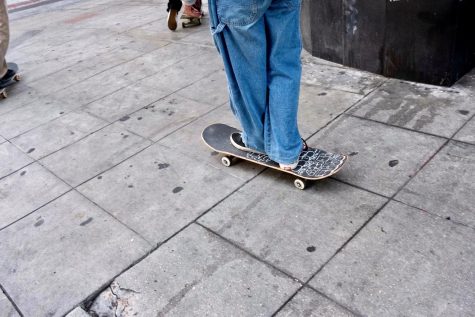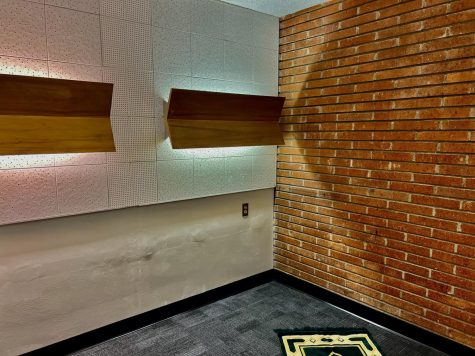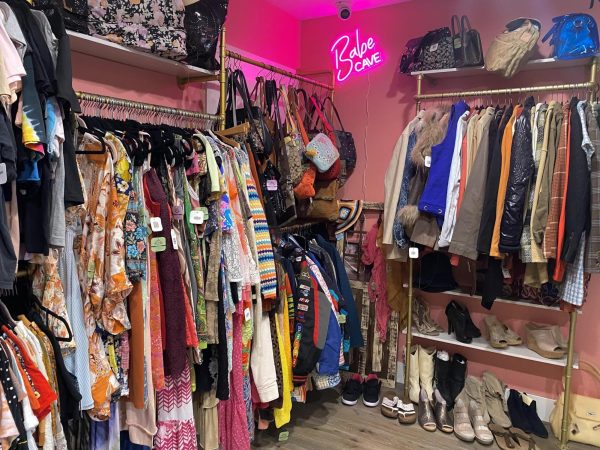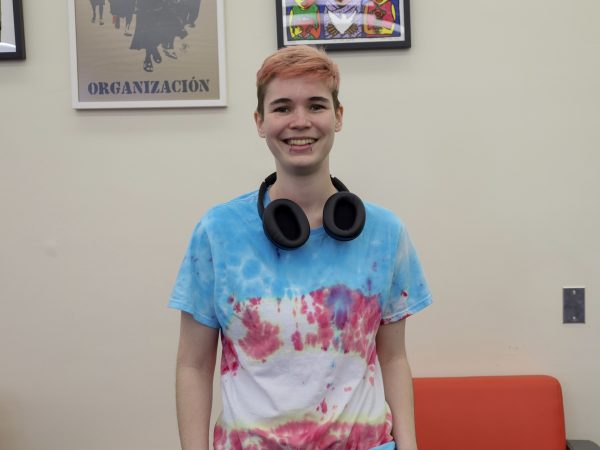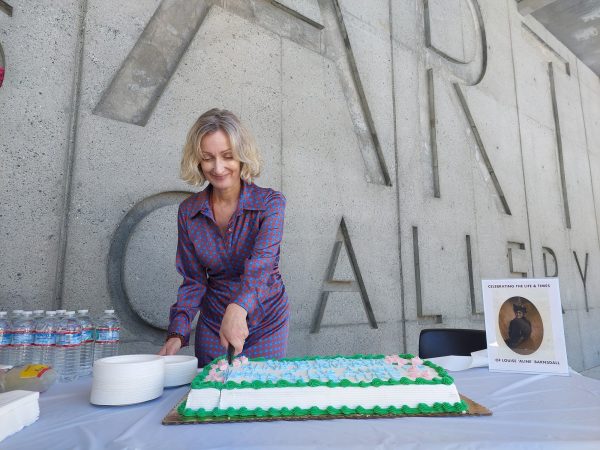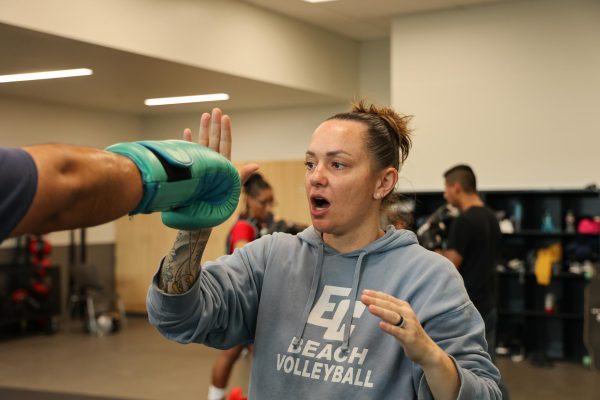Community Roots: A multicultural woman finds and builds welcoming communities
Monica Delgado poses in front of the yellow flowers near White Point Beach in San Pedro on Sunday, May 7. Delgado is the student success coordinator for the Social Justice Center at El Camino College. (Ash Hallas | Warrior Life)
Ever since Monica Delgado was a child, people have incorrectly guessed her ethnicity.
Delgado’s Puerto Rican mother was pregnant, living in Santiago, Chile, until the socialist government was overthrown and Delgado’s mother and father fled to Texas from the military dictatorship.
Delgado was born in Texas, but says she does not have Texan pride because she has no strong roots or connections to that state. She lived there for the first nine years of her life and despite not liking to mention how she was born in Texas, she does have happy memories of the international childhood friends she made while living in Texas.
When Delgado’s parents separated, she moved to New Mexico with her mom.
“Which tribe are you from?” A question Delgado often heard growing up in New Mexico, as people assumed she was Native American based off of her thick, dark brown hair and tan skin. Although Delgado did feel welcomed by the Native community in New Mexico as a child, she still felt different and disconnected from her culture.
Delgado is a 45-year-old Bolivian and Puerto Rican woman who has been able to set strong roots within any community she joins and strives to create open spaces for anyone to feel welcome. She has done this by being a member of Taller Bula (an Afro-Puerto Rican Bomba group), being the owner and Professora of ArteLuta Capoeira Academy (a Capoeira school), and being the student success coordinator for the Social Justice Center at El Camino College.
Delgado credits her desire to build welcoming communities to her first time visiting Bolivia.
Compared to growing up in New Mexico where she was often misidentified as a different ethnicity, going to Bolivia at 15 years old with her Bolivian father was when she felt fully accepted and at home. Since then, Delgado has successfully created different communities with the goal of having people experience the same warmth she felt in Bolivia.
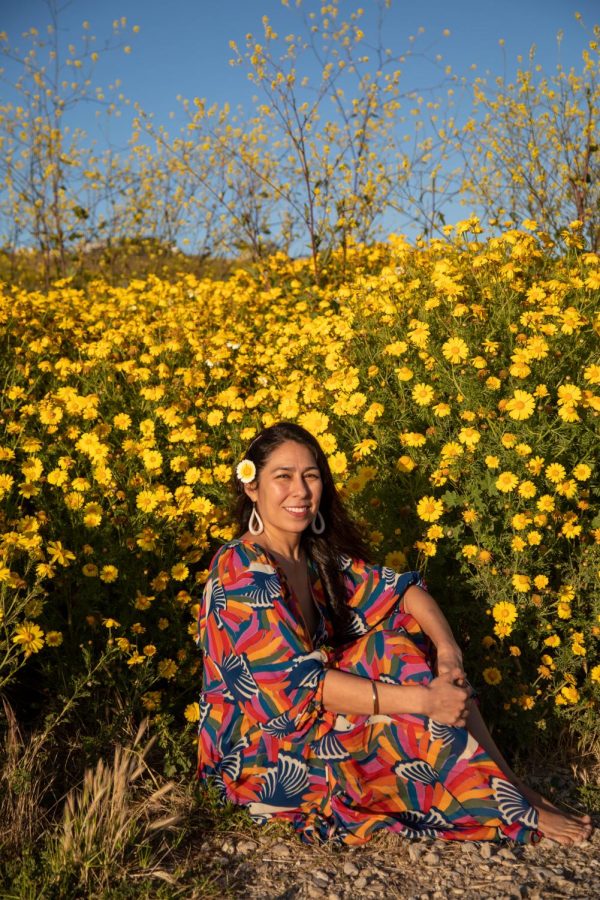
A tool that has helped Delgado assess what her true goals are is the vision board. Vision boards are a handmade poster that contains the personal goals one may have for each year, which helps the person remember their ultimate goal in life and to not get distracted by different obstacles.
Playing with the red beads on her necklace, Delgado recalls the power her vision boards have had throughout her life. The boards that have her new goals for each year hang beside her bed so she can see her aspirations everyday when she wakes up. Her eyes squint as the power of her smile pushes her cheeks up.
“Opportunities may be missed if you don’t remind yourself of your goals,” Delgado says.
Delgado’s love and appreciation of vision boards has been incorporated inside the Social Justice Center at El Camino College. Across from Delgado’s desk inside the Social Justice Center hangs a poster-sized bubble map, drawn in colorful markers showing the connections the center has with different campus clubs and the future goals and plans the student workers have for the center.
Working at El Camino College as the program coordinator, Delgado was set on creating a Social Justice Center that allowed any student to voice their opinions and ideas on how to make El Camino College a more accepting and accommodating environment.
The creation of the Social Justice Center was approved during quarantine, allowing Delgado time to gather the resources and hire student workers to make the center a success before it would open on Sept. 28, 2022. The Social Justice Center is now a space where clubs can meet and hold events that are tied to the concept of bringing students with similar backgrounds together and feeling accepted.
Despite Delgado being the one who advocates for the students’ ideas and events they want to hold for the Social Justice Center, she insists the true power of the Social Justice Center comes from the student workers who brainstorm the ideas and goals they want to see happen on campus.
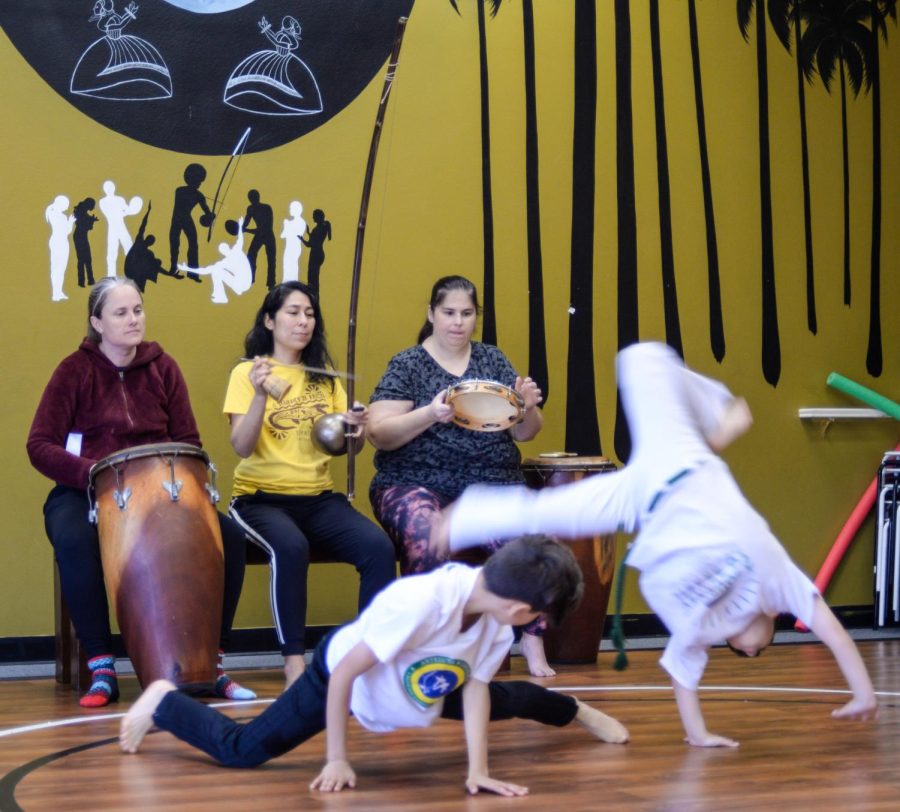
“Students are at the forefront [of the Social Justice Center], I’m just here to amplify their voices,” Delgado says.
When Delgado is not the student success coordinator for the Social Justice Center, she is the professora at ArteLuta Capoeira Academy, where she and her husband Luiz “Varal” co-own and teach in Lomita. Varal is Brazilian and has encouraged Delgado’s journey to learning Capoeira and Brazilian culture.
Being an Afro-Brazilian art form, Capoeira reflects life in a series of offensive and defensive martial art moves that are similar to an intimate dance between the two participants.
ArteLuta Capoeira Academy performs a monthly roda (the circle surrounding the dancing Capoeiristas) at every First Thursdays Art Walk event in San Pedro.
Delgado and the other Capoeira students find themselves performing at 7 p.m. on a spring night in San Pedro.
The roda grows as people walking on the sidewalk of the event take interest in the singing and martial arts performance. The sounds of the Berimbau fill the street as Delgado and the other Capoeiristas play the single-stringed instruments in harmony with each other.
Helping people communicate through dance, Capoeira can show how they interact in real life depending on what moves are used and the frequency and the power of the moves. Because of how vulnerable and true a person becomes when they perform Capoeira, it can be seen as a way of enlightening a person about themselves and their true personalities, Delgado says.
Delgado says that Capoeira has the power to make people more self aware about themselves and their relationships because she has seen it happen with others in her class and it has personally happened to her.
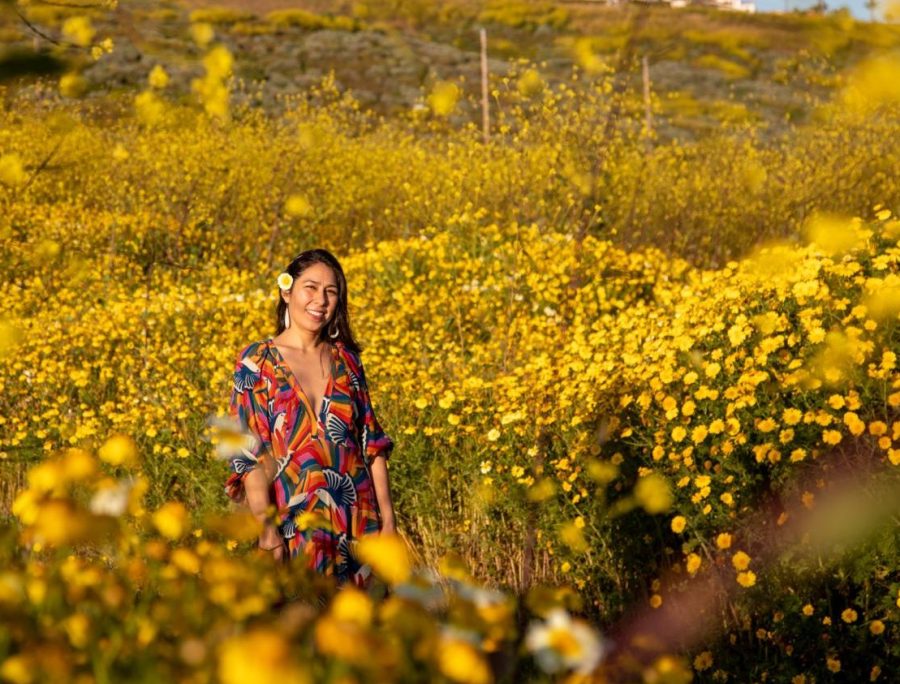
The rasteira sweep move that made Delgado hungry for power affected her relationships between her dance partners. Match after match, Delgado used rasteira against every partner with whom she danced with. It wasn’t until her teacher pulled her aside and told her she can no longer use the sweep movement did she notice that almost every Capoeira partner she danced with was using defensive moves in avoidance of her notorious sweep.
This realization made her self reflect about why she wanted to repeatedly use the sweep when dancing and how that was affecting her relationships with her Capoeira dance partners.
Since then, Delgado’s relationships in her Capoeira classes have grown and she is recognized as a “highly regarded figure” in the Capoeira community, Grant Hartwell says.
Hartwell, a student of ArteLuta for nine years, has worked side-by-side with Delgado and admires her ability to be able to be a full-time worker at El Camino College, a member of Taller Bula, run a Capoeira business and be a mother.
Hartwell looks up to Delgado as a friend and mentor.
“If we can all be like Monica, the world would be a better place,” he says.
During quarantine, Delgado wanted to get more in touch with her Puerto Rican culture – that’s when she discovered Taller Bula, an Afro-Puerto Rican dance and drumming group that primarily plays Bomba.
Joining this group has helped Delgado become more attached to her Puerto Rican culture and has become another place where Delgado has made strong connections and roots to.
Melody Gonzalez has been a part of the Taller Bula since it was founded and has known Delgado since they were both members of another Bomba group called Atabey. Gonzalez says she first thought Delgado was shy and has watched her “recognize and grow into her power.”
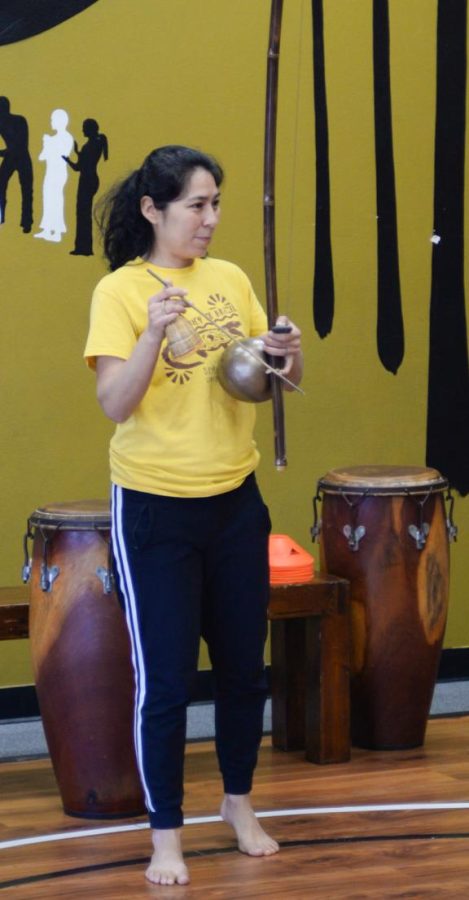
Gonzalez sees the progress Delgado has made throughout her life and feels very proud of her accomplishments. She says Delgado has the power to “build and heal communities” due to her “warrior spirit, but gentle and calm demeanor.”
Gonzalez is not the only one to refer to Delgado as a warrior. Hector Rivera, a friend of Delgado’s and member of the Taller Bula, compares Delgado to the book, “The Sacred Path of the Warrior,” due to Delgado’s ability to embrace change through embracing Bomba and expanding her knowledge of Puerto Rican culture.
Delgado does her best to surround her 9-year-old son Caetano in his culture. Caetano overhears the Bomba music she plays in Taller Bula. Listening to his mother sing and dance in the group has made Caetano more comfortable in his culture and was once heard singing a well-known Bomba song in the shower.
“I felt so much joy hearing him sing,” Delgado says.
Knowing that Caetano has interest in his cultures makes Delgado overwhelmed with joy because she fears that as generations go on, the Bolivian, Puerto Rican and Brazilian cultures and traditions that run through Caetano’s veins will go with it.
Because Delgado’s parents had to leave their home country, she has been making a valiant effort to keep her culture alive in herself and in her son.
Despite not living in Puerto Rico or Bolivia, the roots of culture flow strong in the Delgado bloodline and in the sense of community she has been able to build around her.
“It’s a warm, empowering feeling – to feel like you belong somewhere,” Delgado says.
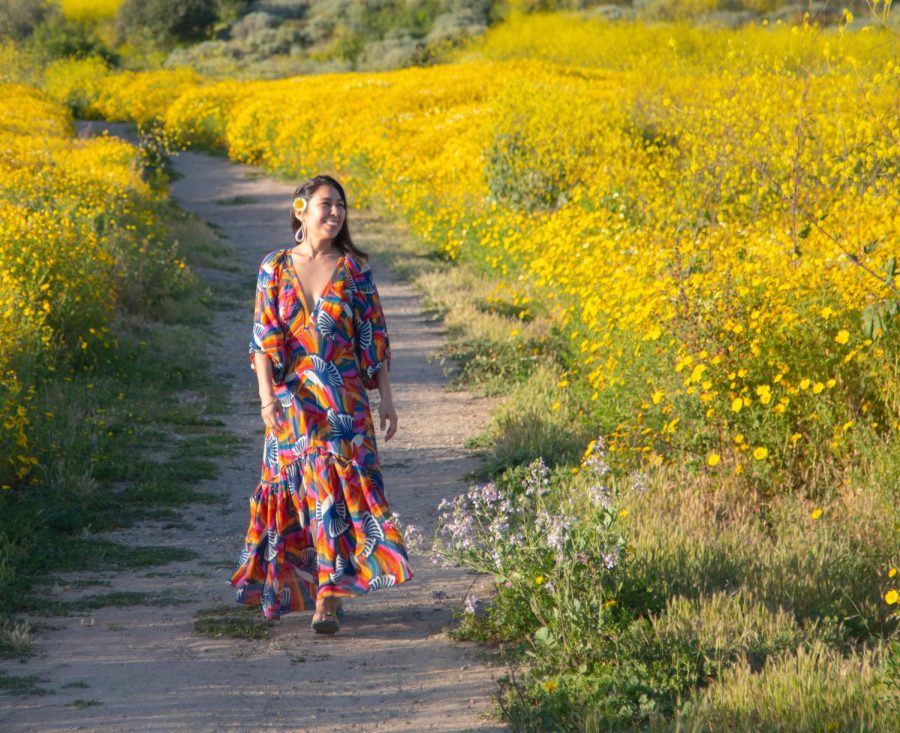
Editor’s Notes:
- Headline was updated and photos were enlarged on Saturday, June 10.
- Links were added on Monday, June 19.


